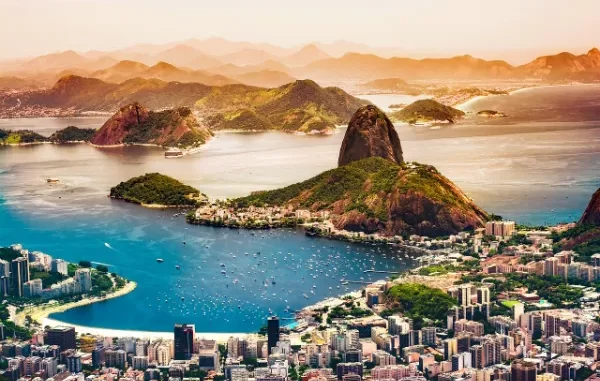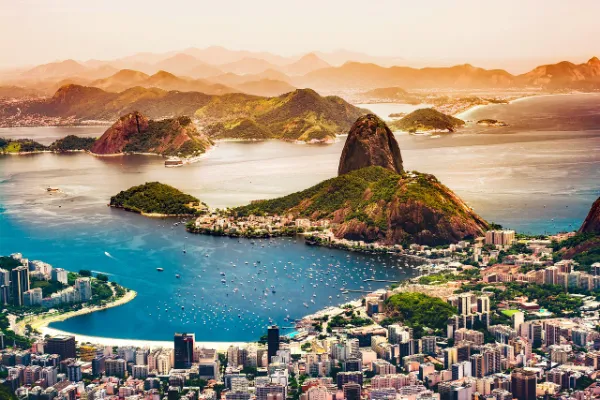
Uncovering the Rich Geography and History of Brazil
Brazil is a vast, diverse, and captivating country with a rich geography and history. Located in South America, it is the fifth-largest country in the world by both area and population. It is bordered by every South American country except Ecuador and Chile, in addition to the Atlantic Ocean.
Brazil is a land of striking contrasts. Its terrain includes vast tropical rain forests, expansive dry savannas, and high-altitude mountains. The Amazon River, the world’s second longest river, runs through the middle of the country. The Amazon is home to a vast array of wildlife, including jaguars, sloths, and macaws.
The country’s climate is tropical and varies from region to region. The northern regions tend to be hot and humid, while the south is cooler and drier. The country also has a wide range of climates, from the tropical regions of the Amazon to the cold and snowy highlands of the south.
Brazil has a long and colorful history. It was originally inhabited by a variety of indigenous tribes, including the Tupi, Guarani, and Arawak. Europeans first arrived in the early 1500s, led by the Portuguese explorer Pedro Álvares Cabral. The Portuguese established a colony in Brazil and eventually colonized the entire region.
In 1822, Brazil declared its independence from Portugal, becoming the only South American country to have done so peacefully. After a period of civil unrest and military rule, Brazil transitioned to a democratic republic in 1985.
Today, it is a vibrant and diverse nation, with a population of over 200 million people.
Brazil is a fascinating country, with a rich geography and history. From the Amazon rain forest to the highlands of the south, the country is full of wonders. Its vibrant culture, diverse population, and vibrant history make it a truly captivating place to visit.
Exploring the Unique Wildlife and Natural Wonders of Brazil
Brazil is a vast and diverse country with an abundance of wildlife and natural wonders, making it a great destination for eco-tourism. From the tropical rainforests of the Amazon in the north to the Pantanal wetlands in the south, Brazil has some of the most unique and spectacular wildlife on the planet.
The Amazon rainforest is home to an estimated 2.5 million species of plants and animals, many of which are still to be discovered. Jaguars, capybaras, tapirs, howler monkeys, sloths and over 1,500 species of birds are just some of the incredible creatures that inhabit this ancient ecosystem. The rainforest also provides a home to numerous indigenous tribes, who continue to live in harmony with nature.
The Pantanal wetlands are a unique and biodiverse ecosystem situated in the heart of Brazil. Covering an area of approximately 230,000 square kilometres, the Pantanal is the world’s largest tropical wetland and is home to a huge variety of wildlife including primates, jaguars, caimans, hyacinth macaws and over 650 species of birds.
Brazil’s Atlantic coast is also a unique destination for eco-tourism. Visitors can explore the stunning beaches and crystal-clear waters of the coast and even spot some of the world’s most iconic sea creatures such as the endangered leatherback sea turtles, humpback whales, dolphins and sea lions.
There are also several other natural wonders to explore in Brazil. The Iguazu Falls are some of the most impressive waterfalls on the planet, and the impressive sandstone formations of the Lençóis Maranhenses National Park are a sight to behold.
With its incredible array of wildlife and natural wonders, Brazil is a great destination for eco-tourism. From the Amazon rainforest to the Pantanal wetlands, the Atlantic coast and beyond, the country offers an abundance of unique experiences for travellers who wish to explore its stunning landscapes and discover its rich wildlife.
Discovering the Cuisine and Culture of Brazil
Brazil is a fascinating country with a vibrant culture and a delectable cuisine. From the Amazon rainforest to the majestic beaches of the south, Brazilian culture is a vibrant mix of African, European, and Indigenous influences. This diverse heritage has resulted in a unique food culture that is both delicious and nutritious.
Brazilian cuisine is renowned for its diversity and complexity. It is characterized by a mix of ingredients, flavors, and cooking styles that reflect the many influences of its people. Traditional dishes such as feijoada, a hearty black bean stew, and moqueca, a fish stew, are staples of Brazilian cuisine. Other popular dishes include churrasco, a type of grilled meat, and pão de queijo, a cheese-filled bread.
The Brazilian diet is largely plant-based, with most meals being centered around rice, beans, and other vegetables. Fruit is also an important part of the diet, and tropical fruits such as mango, papaya, and guava are commonly eaten. Meat, poultry, and fish are also popular, though they are typically not consumed in large quantities.
Brazilian culture is centered around family, friends, and celebration. Music and dance are important facets of Brazilian life, and festivals and carnivals are held throughout the year. Soccer is also a major part of Brazilian culture, and the national team is one of the most successful in the world.

Brazilian cuisine and culture are a reflection of the diverse and vibrant people who inhabit the country. From the Amazon rainforest to the sandy beaches of the south, Brazilian culture is steeped in tradition, history, and flavor. Whether it’s feijoada or churrasco, Brazilian cuisine is sure to tantalize the taste buds and leave a lasting impression.
Experiencing the Fascinating Festivals of Brazil
Brazil is a culturally vibrant country with a rich variety of festivals and celebrations. Many of these events are steeped in tradition and have been celebrated for centuries. Here are some of the most fascinating festivals in Brazil that you won’t want to miss.
Carnival
This is the most famous festival in Brazil. It is held in Rio de Janeiro in February or March and is celebrated with parades, dances, and music. People dress up in colorful costumes and masks and take to the streets for a week of revelry and celebration. The carnival is an important part of the Brazilian culture and is a great way to experience the country’s traditions.
Festa Junina
This festival is held in June and is celebrated in many parts of the country. It is a festival of music, dancing, and food. People dress up in traditional costumes and participate in parades and parties. There are also traditional games such as quadrilha, which is similar to square dancing.
Festa do Divino Espirito Santo
This festival is held in the state of Pernambuco in June or July and is a celebration of the Holy Spirit. People take part in religious processions and participate in dances and singing. The traditional foods eaten during this festival include smoked meats, cassava, and cachaca.
Sao Joao Festival
This festival is held in June in the state of Bahia. It is a celebration of St. John the Baptist and is celebrated with parades, fireworks, and traditional food. People dress up in colorful costumes and dance in the streets. This festival is a great way to experience the culture and traditions of Brazil.
Festa de Sao Sebastiao
This festival is held in January in the city of Sao Paulo. It is a celebration of St. Sebastian and is celebrated with traditional music, dancing, and food. People dress up in traditional costumes and take part in parades and processions. This festival is a great way to experience Brazilian culture and traditions.
From the vibrant Carnival to the religious Festa de Sao Sebastiao, there is no shortage of fascinating festivals to experience in Brazil. Each festival is unique and provides a great opportunity to experience the country’s culture and traditions. If you are looking for a truly unique cultural experience, then you won’t want to miss out on the festivals of Brazil.
Revealing the Unusual Traditions of Brazil
The nation of Brazil is known for its vibrant culture and beautiful beaches, but few are aware of the unique traditions that are still practiced today. Many of these customs are centuries old and have been passed down through generations. From religious celebrations to music and art, the traditions of Brazil provide a glimpse into the nation’s past and a way for people to connect with their heritage.
One of the most celebrated holidays in Brazil is Carnaval, a four-day festival held in February or March. During this time, people take to the streets to celebrate in elaborate costumes and dance to traditional Samba music. The festival ends with a massive street party throughout the cities of Brazil.
Another important ritual in Brazil is the Festa Junina, a June harvest festival. This is an agricultural celebration of the beginning of winter and includes traditional dances, bonfires, and fireworks. Participants dress in colorful clothing and celebrate with traditional music and food.
The Círio de Nazaré is another significant religious ceremony that takes place in the nation’s capital. This celebration is in honor of Our Lady of Nazareth, the patron saint of Brazil. During this event, thousands of devotees march through the streets carrying a statue of the Virgin Mary.
Brazil is also home to many unique art and music traditions. Capoeira is a martial art form that combines acrobatics and music. It is believed to have originated in Brazil during the 16th century and has since become popular all over the world. Another popular form of music is samba, which is often the soundtrack of Carnaval celebrations.
Brazil is a nation full of color and culture. Its unique and unusual traditions help to keep the nation’s history alive and give people a way to connect to their heritage. From religious ceremonies to music and art, Brazil’s traditions are an essential part of the nation’s identity.






Leave a Reply